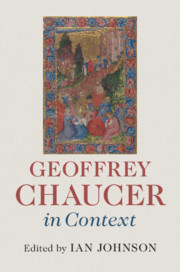Book contents
- Geoffrey Chaucer in Context
- Geoffrey Chaucer in Context
- Copyright page
- Contents
- Illustrations
- Contributors
- Abbreviations
- Introduction
- Part I Chaucer as Context
- Part II Books, Discourse and Traditions
- Part III Humans, the World and Beyond
- Part IV Culture, Learning and Disciplines
- Chapter 26 Childhood and Education
- Chapter 27 Philosophy
- Chapter 28 The Medieval Universe
- Chapter 29 Medicine and the Mortal Body
- Chapter 30 The Law
- Chapter 31 Art
- Chapter 32 Architecture
- Chapter 33 Heraldry, Heralds and Chaucer
- Part V Political and Social Contexts
- Part VI Chaucer Traditions
- Further Reading
- Index
Chapter 29 - Medicine and the Mortal Body
from Part IV - Culture, Learning and Disciplines
Published online by Cambridge University Press: 24 June 2019
- Geoffrey Chaucer in Context
- Geoffrey Chaucer in Context
- Copyright page
- Contents
- Illustrations
- Contributors
- Abbreviations
- Introduction
- Part I Chaucer as Context
- Part II Books, Discourse and Traditions
- Part III Humans, the World and Beyond
- Part IV Culture, Learning and Disciplines
- Chapter 26 Childhood and Education
- Chapter 27 Philosophy
- Chapter 28 The Medieval Universe
- Chapter 29 Medicine and the Mortal Body
- Chapter 30 The Law
- Chapter 31 Art
- Chapter 32 Architecture
- Chapter 33 Heraldry, Heralds and Chaucer
- Part V Political and Social Contexts
- Part VI Chaucer Traditions
- Further Reading
- Index
Summary
This chapter addresses the tension between care for the body and care for the Christian soul within medieval medicine. In particular, it argues that medieval patients often devalued the skill and knowledge of physicians, since physicians were perceived to be overly concerned with the study of medicine rather than its praxis. Moreover, the relative inability of the medieval medical practitioner to combat death effectively (despite charging large fees for his service) led to the development of literary motifs mocking the incompetence of physicians. This chapter argues that Chaucer shared many medieval English prejudices against physicians as a social class, as well as the perception that human beings had only limited recourse against the dictates of mortality. It also provides a survey of many of Chaucer’s invocations of medical theory, and contextualises Chaucer’s attitudes to medicine and medical practice within a larger literary and historical context.
- Type
- Chapter
- Information
- Geoffrey Chaucer in Context , pp. 252 - 258Publisher: Cambridge University PressPrint publication year: 2019

